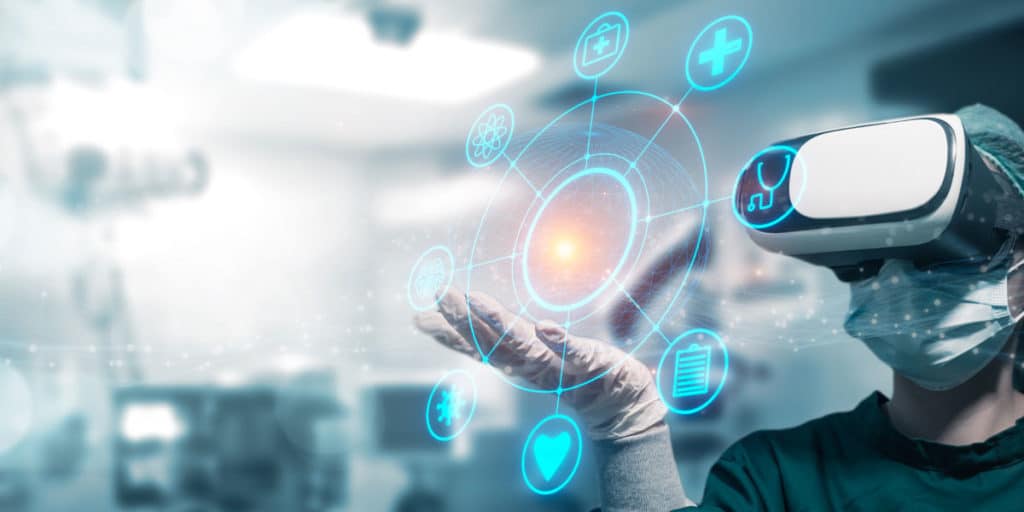Table of Contents
Healthcare sector is known for its progressive approach when it comes to technology and patient care delivery. Hospitals are widely using artificial intelligence, augmented and virtual reality technologies, chatbots, IoT solutions, and now – Metaverse – to improve their customers suttisfuction and quality of their services.
The metaverse has the capability to lead to game-changing medical advances. However, what does metaverse mean? Consider the metaverse to be the new generation of the internet. This entails a whole new method of engaging with one another and engaging with information online. In the metaverse, virtual and augmented reality, artificial intelligence, and quicker and more seamless connectivity enabled by 5G and other capabilities will be utilized. Hence, those who are prepared to accept this new technology and methods of operation, needs healthcare software company which can undertake a significant transformation for the better.
Additionally, the influence of this evolving technology on the global healthcare business will be considerable. We already see significant changes due to technology under lockdown during the epidemic. For instance, when patients were reluctant to come into the hospital or medical facility, many physicians began utilizing video chats to diagnose them. Furthermore, let’s look at how metaverse will shape the future of healthcare.
Surgery with Metaverse
Clinicians have previously employed AI, VR, and AR to do less intrusive procedures. Utilizing this immersive technology, health personnel may see a patient’s body in 3D, making it easier for them to organize and carry out procedures.
Furthermore, for doctors-in-trainings to refine their trade and experience numerous technical difficulties and complexities, AR and VR simulations in the metaverse are another safe option. Even during surgery, a surgeon may use a head-up monitor to examine screen data or photos without turning their head away from the patient on the operating table.
Telehealth
Based to reports, telehealth use increased 38 times between the pre-pandemic period. Because of the metaverse, we can now enhance current medical services. Moreover, in the metaverse, medical practitioners may digitally examine people and perhaps detect certain illnesses.
Moreover, owing to metaverse software development, people will no longer be restricted to seeking advice from healthcare experts in their near vicinity. What is necessary is that both patients and clinicians wear headphones so that patients from other nations may access professionals from other countries and vice versa. This is particularly beneficial in regions where there are a scarcity of health professionals or where individuals have difficulties in getting access to treatment.
Clinical Education and Training
New options for incredibly immersive clinical training and instruction will be made available via the metaverse. In a VR learning environment, students and trainees might investigate the actual body’s anatomy. In the metaverse, many opportunities exist to solve issues, foster innovation, and design learning environments.
For instance, the Academy, a cutting-edge training facility for the World Health Organization (WHO), has introduced a new function in its training program that uses augmented reality to teach healthcare professionals how to be safe while dealing with COVID-19 victims. The application teaches how to properly put on and take off protective gear (PPE).
Moreover, a student may “learn by doing” during the demonstration by controlling the actions of the figure as it puts on and takes off PPE instead of just watching a training film.
Another example is the Novarad Corporation’s OpenSightTM Augmented Reality System for Education, which gives teachers and students with an interactive experience of any donor study that can be carried out using a CT scanner. Students may use voice commands to operate holograms that represent organs, bones, and soft tissues while wearing Microsoft HoloLens 2 gear.
Furthermore, utilizing digital twins, that are virtual models of activities, items, or systems, medical practitioners may build “test dummies” for humans. Employing these digital twins in the metaverse, they could predict how individuals will react to medications and recover from diseases or surgery.
Mental Health Treatment in the Metaverse
The metaverse might entirely change the way that mental health is treated. Psychiatrists and psychotherapists might use realistic activities in the metaverse to address problems like:
- Post Traumatic Syndrome(PTS)
- Hallucinations
- Psychosis
- Anxiety disorders
- Delusions
- Eating problems
Furthermore, those with disabilities or facing geographic challenges to treatment may have access to mental health services because of the metaverse.
Takeaway
Looking at these instances, it’s evident that the metaverse will assist the healthcare industry in various aspects. Metaverse and healthcare have traditionally collaborated to get the most significant outcomes, which may now extend to the virtual world.
